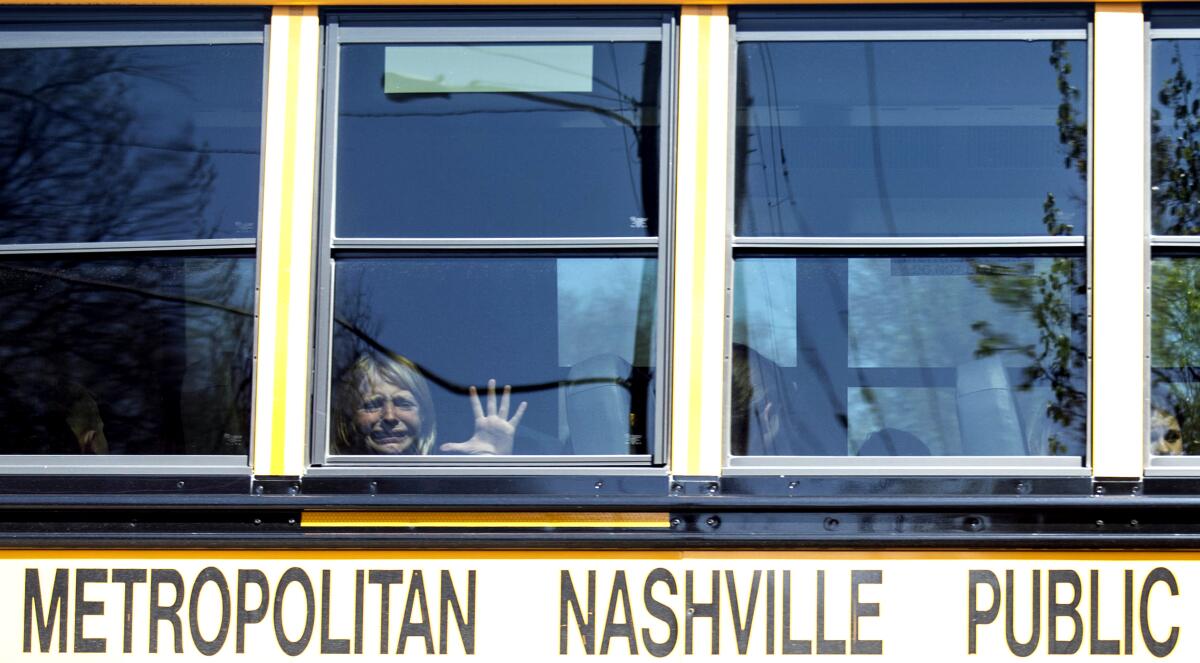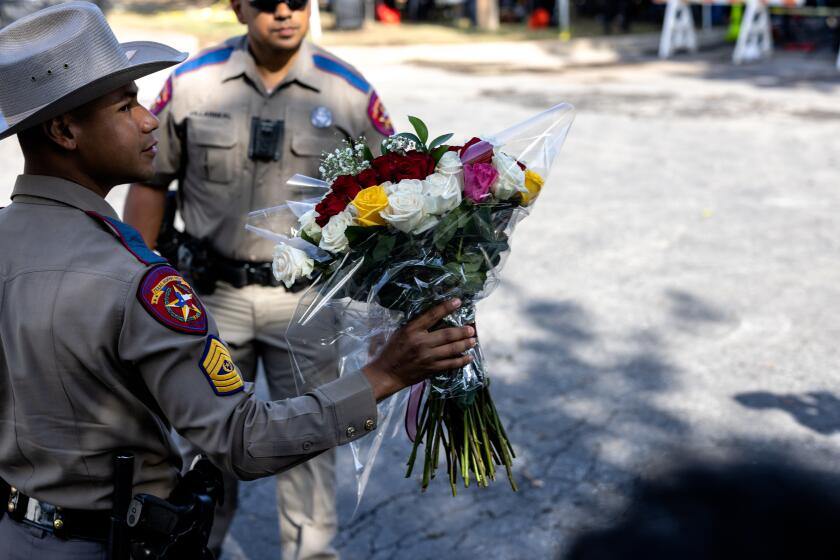Editorial: Nashville and a nation of mass shooting trauma

- Share via
Another 200 children became survivors of gun violence Monday, this time in Nashville, when a 28-year-old armed with high-powered weapons broke into their school and opened fire, killing three 9-year-old classmates and three adult staff members.
The kids, along with employees of the private elementary school, join the growing number of Americans who have been touched by gun violence, who have had to shelter in place or run for their lives or confront the possibility that their lives will soon end by a bullet. And they also join the ranks of mourners for family, friends and colleagues who could not be protected or escape.
Just how common is it to be a survivor? Outside the Nashville school, Joylyn Bukovac, a local television reporter covering the killing rampage, shared that she, too, had survived a shooting at her middle school in 2010.
Perhaps it’s the fate of the United States to watch its soul die along with the 19 students and two adults shot to death Tuesday at an elementary school in Uvalde, Texas.
At another point, a woman crashed a television news conference, asking, “Aren’t you guys tired of covering this?” That was Ashbey Beasley, who had been at the July 4 parade in Highland Park, Ill., last year when a gunman opened fire on the crowd, killing seven people. Beasley was in Nashville visiting family and was going to have lunch with Shaundelle Brooks, whose older son was killed in a 2018 mass shooting at a Waffle House. The women bonded over their gun control advocacy. But Brooks got word that her younger son’s high school was on lockdown because of the gunfire nearby.
“I couldn’t even fully process it,” Beasley told the Washington Post. “What do you say? Because only in America can you survive a mass shooting and go and make a friend who is the victim of a mass shooting and then go to meet that friend for lunch … and end up in the middle of another mass shooting event.”
When we look beyond horrific headline-grabbing mass shootings, the tally of loss and sorrow compounds. Just in the last week, two administrators were shot at a high school in Denver and a student was shot in the parking lot at a high school in Dallas. Each day, children and adults are killed or maimed in shootings in neighborhoods, homes, houses of worship, grocery stores and movie theaters. Even some of the most powerful people in the nation — members of Congress — are not immune. There is no safe place.
Even a domestic violence restraining order isn’t justification to stop dangerous people from carrying guns? The bizarre 5th Circuit Court ruling and others like it will be the death of us.
How much longer before most Americans can count themselves as survivors of gun violence? What does that do to the national psyche? For parents to say goodbye to their children each morning with the lingering fear it will be the last time they see them. For young people who are trained by the culture to constantly scope out exit routes in case there is a shooter.
We’re a country that purports to care about human life, yet we tolerate frequent mass casualties from guns. While conservative legislators in Tennessee and other states spend their time trying to ban books or drag queens, curtail gender-affirming care for transgender youth, or whitewash public school curriculum in the name of protecting children, they refuse to take meaningful steps to reduce the leading cause of their death in America: gun violence.
President Biden on Monday again called on Congress to ban assault weapons and close gun background check loopholes. A majority of Americans support stronger rules on the sale of guns and feel increasingly dissatisfied with the nation’s failure to more strictly regulate firearms. But too many state and federal lawmakers, mostly Republican, won’t buck the gun lobby and its extreme ideology that even common-sense restrictions amount to government oppression.
So, instead, Americans live with another kind of oppression — the crushing fear that they might be the next victim or survivor of gun violence.
More to Read
A cure for the common opinion
Get thought-provoking perspectives with our weekly newsletter.
You may occasionally receive promotional content from the Los Angeles Times.












